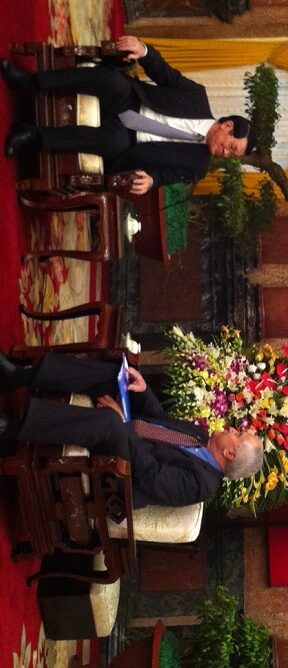An Israeli-Vietnamese agriculture research and development fund — and a free-trade agreement between the two countries — may be established soon, following a series of high-level visits in celebration of 20 years of diplomatic relations between Israel and Vietnam.
Itzik Ben-David, deputy director-general for foreign trade and international relations for Israel’s Ministry of Agriculture, tells ISRAEL21c that he and Shamir recently flew to the Southeast Asian country along with an Israeli agricultural business delegation led by Israel Export Institute CEO Ofer Sachs. It was the third time that an Israeli minister of agriculture has visited Vietnam since 2007.
“There are many commonalities between our peoples in their modern history,” says Ben-David, “including a struggle for independence and economic development. In Vietnam, agriculture is a very important economic sector because 70 percent of the population lives in rural areas, drawing income from farming.”
Vietnam’s population is more than 91 million, compared with Israel’s 8 million. Nevertheless, trade between the countries has dramatically increased lately. Israeli exports to Vietnam last year jumped by 120% to $747 million.
Milk, fish, bull semen
Ben-David points out that hundreds of Israeli companies are already doing business in Vietnam – including SAE Afikim , which is running the largest project of its kind in the world and the biggest ever undertaken by an Israeli firm.
This $500 million, five-year deal with TH Dairy Farms in Vietnam will result in supplying Vietnam with 300 million liters of milk annually, produced by imported cows at 12 state-of-the-art mega dairies and a milk processing plant – all built with Israeli equipment and expertise.
“Another Israeli project in the dairy sector is setting up a demonstration dairy farm near Ho Chi Minh City, which was inaugurated a few months ago,” says Ben-David. “We visited it, and saw how it will serve as a base of training for mainly small farmers.”
Several Israeli companies have brought irrigation expertise to Vietnam, and in 2012, the Vietnamese minister of agriculture came to the 18th International Agricultural Exhibition (AgriTech) in Tel Aviv, where he signed a cooperation agreement with Israel on veterinary issues.
“This allowed us to begin exporting Israeli bovine semen to improve the genetic performance of the dairy sector there,” Ben-David explains. “Vietnam was the first big country to acquire this prized semen.”
Furthering research and trade
During their talks at the end of October, Shamir and Vietnamese government officials agreed in principle to establish a joint agriculture research and development fund.
“Minister Shamir raised this idea and it was well accepted by our hosts,” reports Ben-David.
To start the ball rolling, Vietnamese researchers will come to Israel to learn more about blue-and-white achievements in agricultural research at public and private institutions such as the Volcani Agricultural Research Organization , the Hebrew University’s agriculture school and the Technion-Institute of Technology.
“This will serve as a good basis to identify areas of cooperation for the joint research fund,” Ben-David says.
“We also suggested exploring cooperation in aquaculture and other fishery-related topics, which may be the best solution for coping with food security issues. Many more of our companies could be involved there.”
Shamir and Vietnamese President Truong Tan Sang also agreed to the notion of negotiating a free-trade agreement between the two nations by the end of 2014.
Ben-David notes that this would help further the countries’ economic relations in agricultural technology, science and defense. Israel has similar agreements in place with the governments of Italy, Germany, China and Japan.
“We learned during our visit that the Vietnamese are eager to develop agriculture and are allocating a lot of resources toward this, but they charge a 15% custom tax on imported agricultural devices,” says Ben-David.
“A free-trade agreement would ease that situation and allow expansion of overall trade between the two countries, including in fresh and processed produce.”
The five-day visit included meetings with Prime Minister Nguen Tan Dung, National Assembly Vice Chairman Nguyen Thi Kim Ngan and Agriculture Minister Cao Duc Phat.

















